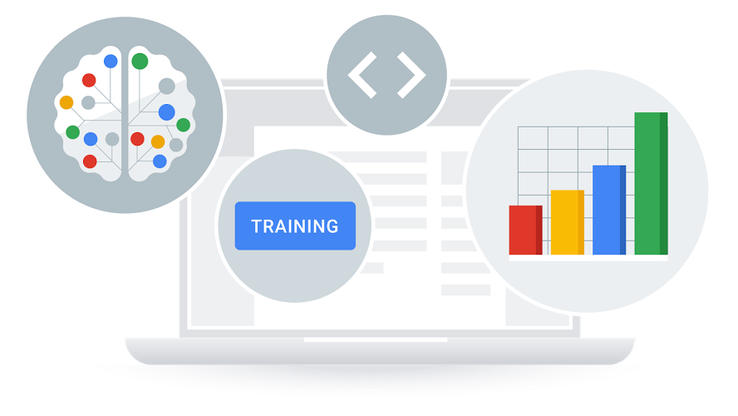

Google has been going all-in on artificial intelligence and machine learning for some time now, and part of that is, of course, nurturing the growing ecosystem around it, from developer tools to startups. Their latest effort, Launchpad Studio, targets one vertical at a time, fostering startups looking to make deep changes to industries lagging behind the cutting edge; the first batch is aimed at the data-rich medical world.
The Studio is independent of Google’s accelerator and investment organs, and, in fact, doesn’t invest at all in the companies it works with. It’s more about tapping the knowledge and hunger found in startups to identify future areas of investment and development.
It’s rather a competitive advantage Google has that this program doesn’t need to turn a profit or produce an impressive portfolio; it can burn money supporting and doing due diligence around smart ideas and cutting-edge algorithms, essentially outsourcing a portion of R&D and opportunity hunting while generating goodwill.
“It’s our hypothesis that there’s a lot of learning to be extracted by looking at an industry and all the ways machine learning can be applied across that industry,” said Malika Cantor, a program manager with Launchpad. “We have the startups draft a project proposal that addresses a sizable machine learning problem they’re approaching in the next 6 months. We focus on solving the technical challenges.”
The medical world is in some ways a logical starting point, because the amount of data generated is huge, as are the potential benefits to unlocking any insights hidden in that data. The regulatory hurdles, FDA roadblocks and other bumps in the road will mainly have to be braved by the startups themselves, in which Google has no stake, and yet the travails of which may help hone future efforts in the sector — perhaps at Verily.
That makes it all sound pretty cynical, but no doubt the company is eager to do some real good, as well. It’s not like they’re getting into drug discovery and patenting. The first set of companies in the six-month program seems quite focused on improving patient outcomes using readily available data.
 BrainQ, whose founder, Yotam Drechsler, I briefly spoke with, is all about using EEG data to improve electromagnetic treatment plans for stroke patients. Now, as a rule, I’m skeptical of EEG-based studies and products, because EEG is a century-old, noisy, often superficial measure of brain activity.
BrainQ, whose founder, Yotam Drechsler, I briefly spoke with, is all about using EEG data to improve electromagnetic treatment plans for stroke patients. Now, as a rule, I’m skeptical of EEG-based studies and products, because EEG is a century-old, noisy, often superficial measure of brain activity.
But bad or noisy data “is exactly where AI advancements come into play,” Drechsler said. Just as machine learning can be relied on to separate the signal from the noise in audio, images and other domains, it can be applied here as well — that’s the theory, anyway. If it works, it could help bring sensation and movement back to affected limbs, getting patients back on their feet or using their hands faster.
CytoVale is another one aimed at improved outcomes at the hospital, specifically relating to sepsis, a serious blood infection that can be fatal if not treated quickly, yet which unfortunately is rather difficult to detect. The company uses a high-speed camera to inspect thousands of cells per second and watch for signs of sepsis using computer vision. Every minute counts with infections, so a test that doesn’t require an outside lab, large blood samples and so on could be a life-saver.
Google Glass makes an unexpected return in Augmedix, which helps put patient records at doctors’ command, freeing them from having to use a terminal or page a nurse or specialist. Hopefully they won’t be checking Twitter during consultations. I never really bought Google Glass as a consumer product, but perhaps in niche situations like this it could be genuinely useful. Where the AI comes in is anyone’s guess, though.
 Last is Byteflies, which is making a modular wearable system that can be configured according to the requirements of clinical trials — tracking “any vital sign, anytime, anywhere,” according to Google’s press release. That’s a big promise that would have similarly big-time cost savings for teams that can’t afford to build a blood sugar monitor or some such from scratch, or buy some overpriced one from a medical supplier. Byteflies would also handle the data produced by the device, offering ML-powered analysis, as well.
Last is Byteflies, which is making a modular wearable system that can be configured according to the requirements of clinical trials — tracking “any vital sign, anytime, anywhere,” according to Google’s press release. That’s a big promise that would have similarly big-time cost savings for teams that can’t afford to build a blood sugar monitor or some such from scratch, or buy some overpriced one from a medical supplier. Byteflies would also handle the data produced by the device, offering ML-powered analysis, as well.
All the companies will be exposed to numerous experts and investors, as well as given hardware and credit on Cloud services, but Google doesn’t retain any special rights like first refusal on a seed round or anything like that. They’ll stay in contact as part of a loose “portfolio” but the accelerator is “investor-agnostic,” Malika said.
There’s no word on how many startups will come through Launchpad Studio — enrollment isn’t set to any schedule — but at some point the team will move on to another vertical, perhaps heavy industry or housing or agriculture. The idea is that the lessons learned in the earlier verticals will stack and make impact greater and easier in later ones.
If this seems like a good path for your company, you can apply now regardless of which industry you’re looking to apply AI and ML to; in fact, chances are the team is using applications to evaluate what industry to target next.
Featured Image: Google

